Rag Radio:
Commander Cody’s Bill Kirchen
is a ‘Titan of the Telecaster’
By Thorne Dreyer | The Rag Blog | February 23, 2012
Bill Kirchen is “a devastating culmination of the elegant and the funky…” — Nick Lowe
Grammy nominated guitarist, singer, and songwriter Bill Kirchen was named a “Titan of the Telecaster” by Guitar Player Magazine and The Washington Post‘s Mike Joyce said, “The folks who make Fender Telecasters ought to stop what they’re doing and cut Bill Kirchen a fat check.”
Bill Kirchen was the guitarist with the legendary Commander Cody and His Lost Planet Airmen from 1967 to the mid 1970s. The band “mixed country music, rockabilly, and blues, on a foundation of boogie-woogie piano,” and Kirchen’s signature licks drove the group’s classic single, “Hot Rod Lincoln,” into the Top Ten.
Kirchen, who is now based in Austin and tours internationally, headlined a rousing benefit for community radio station KOOP at Antone’s nightclub in Austin on Saturday, February 4, 2012, playing to a packed and enthusiastic crowd. Bill Kirchen was also Thorne Dreyer’s guest on Rag Radio, Friday, February 17. He discussed his historic and colorful career and sang four songs, backing himself on the acoustic guitar. Listen to it all here:
on Rag Radio with Thorne Dreyer, Friday, Feb 17, 2012
Bill Kirchen’s career has spanned more than 40 years during which time he has worked with an all-star cast, including Nick Lowe, Emmylou Harris, Doug Sahm, and Elvis Costello. His work has fused rock ‘n’ roll and country music, drawing on blues and bluegrass, Western swing from Texas, and California honky-tonk.
He grew up in Ann Arbor, Michigan, where Commander Cody was formed in 1967, spent time on the West Coast, lived in Washington, D.C. for 20 years, and now lives and performs in, and tours out of Austin.
Kirchen started playing the banjo “during the great folk scare of the Sixties,” but soon turned to the acoustic guitar, “fingerpicking to Mississippi John Hurt.” “I wanted to play acoustic blues,” he told the Rag Radio audience, “but got seduced by the electric guitar.” He obtained his first Telecaster in an impulsive trade with a co-worker when he was working as a motorcycle messenger — and he played that same guitar for 40 years, “until I wore it down to the nub.”
He liked the Telecaster “because it’s real simple. It’s a slab on a stick, with two pickups, two knobs, one switch. It couldn’t be simpler.” But it was one of the original electric guitar styles and was used by several of Kirchen’s favorite players at the time. “I wrote a love song to the Telecaster when I was here in Austin a couple of years ago,” he said. “It was called ‘The Hammer of the Honky Tonk Gods.'”
Kirchen went to high school in Ann Arbor with Bob Seger and Iggy Pop. He didn’t know Seger but says that “Jim Osterberg became Iggy Pop right before my very eyes.” When Iggy was playing with a blues band called the Prime Movers, he was known for singing the blues song, “I’m a Man” (“That’s spelled M-A-N”). But suddenly Pop instead started singing, “I’m a Tricycle” (“That’s spelled T-R-I…”). That’s when, according to Kirchen, “We knew something was afoot.”
“John Sinclair got me my first gig with my first band,” Kirchen said. Sinclair, a “mover and shaker” in the Detroit and Ann Arbor music scenes, was the leader of the White Panther Party and manager of the revolutionary rockers, the MC5.
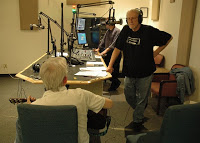 Commander Cody and His Lost Planet Airmen was founded in 1967 in Ann Arbor and the band, which was a pioneer in the country rock genre, went on to become one of the iconic bands of the era.
Commander Cody and His Lost Planet Airmen was founded in 1967 in Ann Arbor and the band, which was a pioneer in the country rock genre, went on to become one of the iconic bands of the era.
In the beginning, “it was an art school kind of a wacky, admittedly stoned, local Ann Arbor thing. Initially it had a floating cast,” he said. They assigned George Frayne the role of “Commander Cody,” a name that was inspired by a 1950’s film serial. “He had a lot of charisma,” Kirchner says. “He was a big lantern-jawed, barrel-chested, Nick Fury-type of guy. And he played great boogie-woogie piano.”
(George Frayne later became an art professor and a widely-exhibited painter, and another original member of Commander Cody, John Tichy, earned a PhD in mechanical and aerospace engineering and became a respected scholar.)
Kirchen says that Commander Cody “turned on a whole generation of people to country music, to hard core blood and guts country music and Western swing that they did not have access to.” They were joined in the country rock/Western swing genre by bands like the New Riders of the Purple Sage and Austin’s Asleep at the Wheel, with whom they frequently worked.
Bill Kirchen says he was attracted to country music because “it had adult themes and, to me, a deeper emotional content. But don’t get me wrong,” he adds. “I’m a big fan of mindless, slack-jawed, ham-fisted rock and roll. It’s a beautiful thing. Seriously, I love it.”
Kirchen is often referred to as a “rockabilly” guitarist. “We certainly did play a bunch of rockabilly,” he says “and I certainly was informed by that, and I know a few rockabilly licks… But I always thought that [term] was a little bit limiting… Especially when rockabilly became in America a kind of… dress-up gig.”
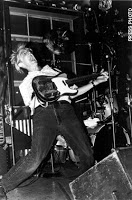 But he definitely is the “self-crowned, self-annointed ‘King of Dieselbilly.'” “I can play anything I want,” he told us, “because I invented the genre.”
But he definitely is the “self-crowned, self-annointed ‘King of Dieselbilly.'” “I can play anything I want,” he told us, “because I invented the genre.”
When he was touring as noted British musician Nick Lowe’s guitar player, “he’d have me do one song a night, and I’d do ‘Tombstone Every Mile,’ a truck-driving song. And he’d introduce me with this fantastic, aristocratic British accent: ‘Ladies and gentlemen, now Bill Kirchen, the King of Dieselbilly.’ And it just stuck with me. I am the King of Dieselbilly.”
Lowe, incidentally, has called Bill Kirchen “a devastating culmination of the elegant and the funky, a really sensational musician with enormous depth.”
Kirchen played at least twice a year at Austin’s vintage Armadillo World Headquarters with Commander Cody. Calling the Armadillo one of the great music venues, Kirchen said, “That was a cool scene, man. If you couldn’t have fun at the Armadillo, go home!”
They played the Armadillo with Greezy Wheels and Maria Muldaur, and Waylon Jennings opened for them “right before he blew up and became huge.” They recorded a live album at the Armadillo, and were featured at the famed club’s legendary final show, the “Last Dance at the Dillo.”
Kirchen loves living and working in Austin. “It’s a very open environment. In many ways, not just music. It’s a very creative town. It’s a little oasis in the middle of Texas.” And it is packed with musicians: “You kick a can and three musicians, three guitar players, will rush out from under the can, clutching their Grammies and their Stratocasters.”
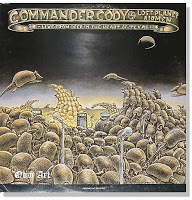 Living in Austin gives Kirchen a unique opportunity to work with musicians he respects. “I got to go and sit in a bunch with the great Alvin Crow who I knew back from his Pleasant Valley days, back when I played here with Cody.”
Living in Austin gives Kirchen a unique opportunity to work with musicians he respects. “I got to go and sit in a bunch with the great Alvin Crow who I knew back from his Pleasant Valley days, back when I played here with Cody.”
And “the Flatlanders live here: Jimmie Dale [Gilmore] and Butch [Hancock]… I used to get to play with them out in California. That’s a fantastic group of original Texans, what a bunch of characters.”
And he just did a gig with blues pianist Marcia Ball — “who is a treasure” — at the Armadillo Christmas Bazaar.
He has been touring regularly — and all over the place. “We played Palestine, which was so cool… and we played up in Lapland, north of the Arctic circle. As you can imagine, less happens in Lapland than in Palestine.”
Kirchen’s latest CD, Word To The Wise on Proper American, features duets with many of the artists he’s worked with over the years, including Elvis Costello, Nick Lowe, Maria Muldaur, and Dan Hicks.
Bill Kirchen closed the Rag Radio show with a song he wrote when he was living in nearby Buda, Texas, before moving to Austin. “I wrote this song when I was walking my dog,” he said. “And you know how dogs are, they’re just happy to be alive. So I wrote a ‘good to be alive,’ song, encouraged by his enthusiasm.”
In the song, Kirchen affirms that,
I’m gonna live each day like there’s no tomorrow
Crank up the love, turn down the sorrow
Get my ducks in a row… one more day…But if living truly is a terminal disease
All I’m askin’ for is a brief reprise
And I can rattle and roll… one more day…
[Thorne Dreyer, a pioneering Sixties underground journalist, edits The Rag Blog, hosts Rag Radio, and is a director of the New Journalism Project. He can be contacted at editor@theragblog.com. Read more articles by and about Thorne Dreyer on The Rag Blog.]
Rag Radio, which has aired since September 2009 on KOOP 91.7-FM, a cooperatively-run all-volunteer community radio station in Austin, Texas, features hour-long in-depth interviews and discussion about issues of progressive politics, culture, and history.
Hosted and produced by Rag Blog editor Thorne Dreyer, Rag Radio is broadcast every Friday from 2-3 p.m. (CST) on KOOP and streamed live on the web. After broadcast, all episodes are posted as podcasts and can be downloaded at the Internet Archive.
Rag Radio is also rebroadcast on Sundays at 10 a.m. (EST) on WFTE, 90.3-FM in Mt. Cobb, PA, and 105.7-FM in Scranton, PA. Rag Radio is produced in the KOOP studios, in association with The Rag Blog, a progressive internet newsmagazine, and the New Journalism Project, a Texas 501(c)(3) nonprofit corporation.
Tracey Schulz is the show’s engineer and co-producer.
Coming up on Rag Radio:
Feb. 24, 2012: Activism in Austin: Representatives of Occupy Austin, Million Musicians March for Peace & a new Austin workers’ cooperative.
March 2, 2012: Music writer Margaret Moser and screen actor Sonny Carl Davis on the movie, Roadie, the Austin Music Awards, and SXSW.
[Our show with journalist & labor activist David Bacon, originally scheduled for Feb. 4, 2012, has been rescheduled for March 16, 2012.]

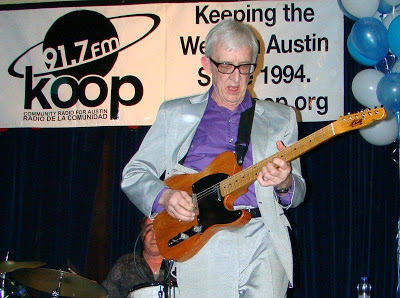
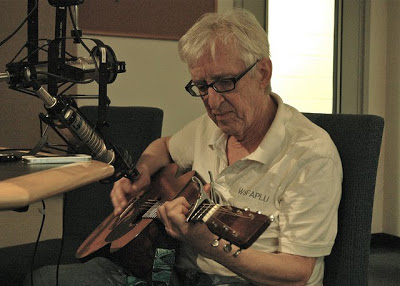

















Great interview with a fine guitar player.